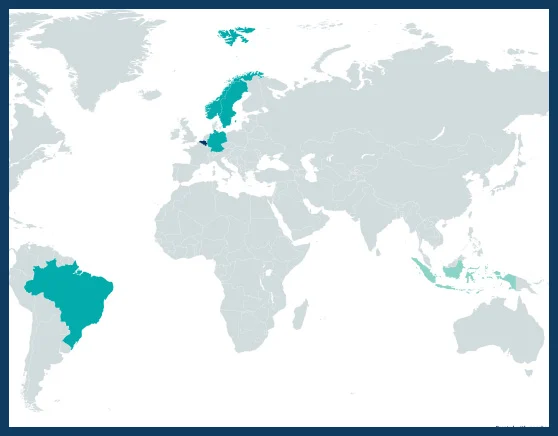01/04/2021 – 31/03/2024
€ 1,263,862
Prof. Dr. Tomaso Ferrando
tomaso.ferrando@uantwerpen.be
Coordinator: Law and Development – University of Antwerp – Antwerp – Belgium Rural development – Federal University of Santa Catarina – Florianópolis – Brazil
Economics – Federal Fluminense University – Niteroi – Brazil
Governance of Ecosystem Services – Leibniz Centre for Agricultural Landscape Research – Muncheber – Germany
Politics and Government – Universitas Gadjah Mada -Yogyakarta – Indonesia
Geography – Norwegian University of Science and Technology – Trondheim – Norway
Sustainability Studies – Lund University – Lund – Sweden

The conversion of natural ecosystems for agricultural land use and minerals’ extraction is one of the main drivers of global biodiversity loss. At the same time, deforestation and forest degradation in the tropics is the second largest source of global greenhouse-gas (GHG) emissions. Despite the scientific evidence about agriculture and mining as major threats to biodiversity and the global climate, the frontiers of global value chains continue to be expanded into tropical forests, causing deforestation, forest degradation and biodiversity loss.
The planetary organisation of value chains is part of the problem: it intensifies the need for meat and minerals, increases the distance between the locations of extraction and production, and places of processing and final consumption. This telecoupling disconnects spaces of consumption with the local socio-ecological impacts of production. In the last years, consumers, governments and companies based in the EU are increasingly looking for solutions to address environmental and social externalities of imported commodities such as meat and minerals. This renewed sensitivity has led to new regulations (e.g., the EU FLEGT), but also transnational corporations to adopt best practices guidelines and certification schemes (e.g., Fairmined).
EPICC applies a polycentric governance and environmental justice approach to investigate four selected commodity chains (cattle, palm oil, gold and tin) that ‘feed’ the European market. EPICC seeks to map the governance and power links that connect the multiple territories of production and transformation and their plural legal systems with the European regulatory, political and socio-economic space. By doing so, EPICC identifies and analyses leverage points (chokeholds) and blind spots, and sheds light on the micro and macro conditions that may facilitate the mitigation of environmental and social impacts that occur at the selected locations of production (in Brazil, Colombia and Indonesia).
EPICC pursues a multi-actor and transdisciplinary approach. Stakeholder involvement is thus one key aspect in each phase of the planned research project: this happens via the organisation of a series of local workshops in Europe and the three countries of origin of the goods, along with the realisation of several rounds of semi-structured interviews with actors directly involved in climate change mitigation and biodiversity project. Commodity chain actors are one of the main target groups and include all actors that shape, implement and are bound by governance structures along the selected commodity chains – from individual workers and owners to consumers, passing through traders, retailers, contractors, national and local governments, and inter-governmental organisations such as the EU.
Project results will be prepared for dissemination in the following formats: i) EPICC project website, including data storage and exchange structure, ii) target group tailored materials in writing (e.g. policy briefs, newspaper articles, short videos), iii) academic publications; iv) policy briefs aimed at relevant stakeholders in the three countries of origin and translated; v) symposia, conference participation and stakeholder workshops in the respective countries.